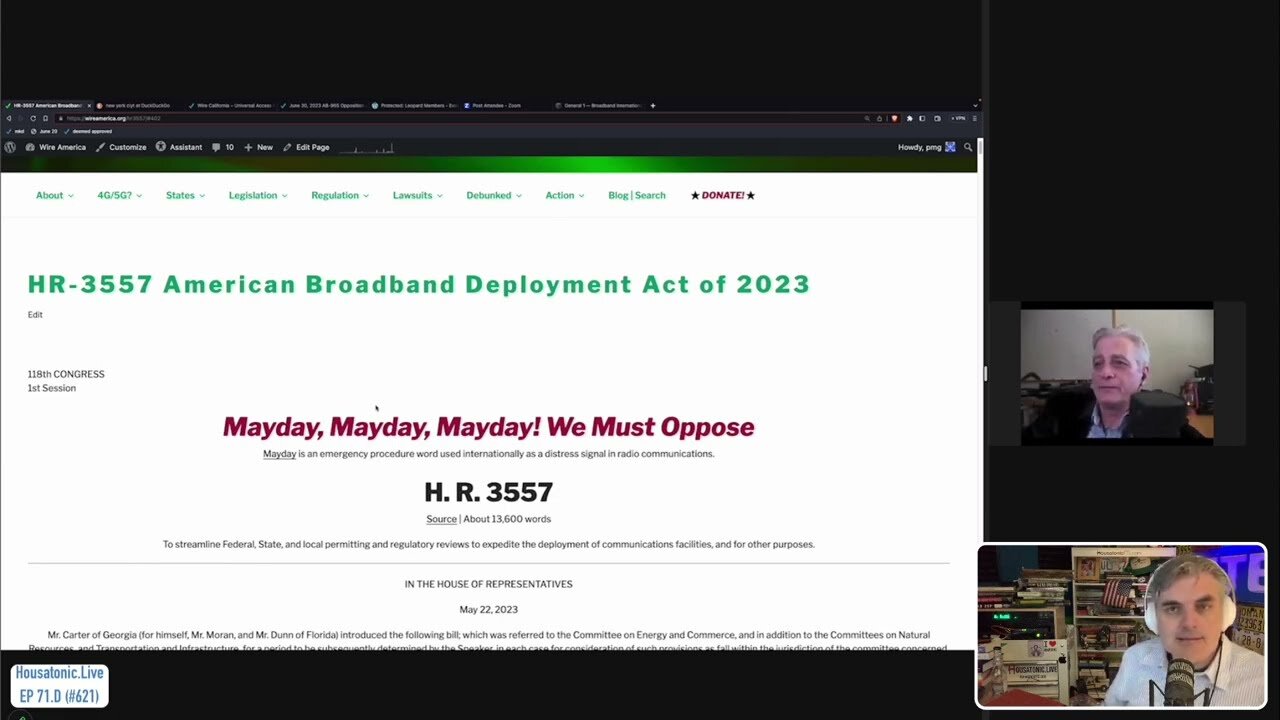Premium Only Content

Warning: Digital Death Grid New Bill. Big Gov. Wireless Tech Power Grab. Digital Prison
Warning: Digital Death Grid New Bill. Big Gov. Wireless Tech Power Grab. Digital Prison
-
THIS IS OUR DIGITAL PRISON IF WE DON’T STOP IT.
-
Jul 14, 2023
-
Wire America https://wireamerica.org/ HR-3557 Bill Text https://wireamerica.org/hr3557 HR-3557 Bill Analysis https://wireamerica.org/hr3557analysis-
-
FAIR USE FOR EDUCATIONAL PURPOSES
-
Mirrored From:
https://www.youtube.com/@whatis5g774
***
https://aim4truth.org/2023/08/16/cat-report-824/
-
WIRELESS TELECOMMUNICATIONS FACILITIES (WTF)
-
The American Broadband Act of 2023 (H.R. 3557) and H.R. 4141 threaten to eliminate state and local control over the zoning and placement of Wireless Telecommunications Facilities
-
(WTF)HR-3557 and HR-4141 are proposed federal telecommunications bills that would eliminate nearly all state and local control over Wireless Telecommunications Facilities (WTF) and would enable the construction of a Digital Prison for Americans.H.R. 3557:
-
“We must oppose this bill. This is the worst bill I have seen in my entire life with respect to telecommunications. You have to understand how bad this is…THIS is the Digital Prison right here.THIS is the bill you cannot let them pass!”
-
Americans Must Oppose U.S. HR-3557
-
H.R. 3557 WOULD…
Override state and local government police powers and property rights and would preempt local authority to manage public rights-of-way and land use for telecommunications infrastructure. This represents a substantial federal overreach into the oversight of the placement of wireless facilities on public rights of way, which is a fundamentally local process and must remain so.
Empower providers to install facilities where they choose regardless of local zoning, thus eliminating the ability of local governments to impose reasonable standards.
Weaken the authority of local governments to regulate the use of our public rights-of-way, and diminishes their authority to locally determine appropriate compensation for such use.
Mandate that all wireless siting decisions be “deemed granted” if not denied by a local government within much shorter periods than the federal government for similar projects. The federal government has 270 days to act, while locals must act as fast as 60 days. It is not appropriate for Congress to apply stricter timelines and restrictions on local governments for these processes than it does on federal agencies.
Mandate that sites be constructed “without any further action by the government,” without notice to the local government, or obligation to comply with safety laws. This would provide no public safety protections for construction of facilities that had been “deemed granted.”
Impose artificially short timelines that are virtually impossible to meet, create technical grounds for defeating incompleteness notices and require local governments to draft, publish, and deliver a written denial decision with reasons to an applicant on the same day that the local governing body hears and votes on the application — a virtually impossible task because such written decisions typically require the examination and analysis of evidence presented to local council.
Require that “all proceedings required by a State or local government or instrumentality thereof for the approval of the request” be taken within the timeline.
Limit the fees that local governments could require which, unlike the current FCC rules, the local government must justify based on a complex rate-making formula.
Substitute the FCC for the local federal district court as the reviewing body for challenges to local government decisions regarding wireless facility applications, thus breaking the promise made by Congress in 1996 that local governments would not be required to travel to Washington to defend local decisions.
Impose new and similarly flawed timelines and “deemed granted” remedies on applications for wireline telecommunications facilities
Undermine the property rights of local governments and damage their ability to protect and preserve the safety, well-being, and aesthetics of their communities. Congress has historically recognized these rights in Sections 224, 253 and 332 of the Telecommunications Act.
Make virtually any local government decision not to allow the installation of a proposed wireless facility at a provider’s request a “prohibition” preempted by federal law.
Eliminate cable franchise renewals, thereby restricting the ability of state or local franchising authorities to enforce franchise obligations such as public, educational, and government channel capacity and facilities, customer service requirements, and system build-out requirements.
Grant cable operators the right to use local rights-of-way to provide non-cable services while prohibiting localities from imposing any fees on non-cable services for use of those rights-of-way.
Pre-empt local governments’ rights-of-way compensation and management authority, zoning powers, cable franchising authority, and property rights.
Impose costs on local governments, burdens on our taxpayers, interfere with public safety and otherwise remove local protections that are the heart of communities while offering no improvement in broadband service.
Create unfunded mandates on local governments and inhibit their ability to be directly responsive to residents and good stewards of public resources.
Bestow on broadband providers an unprecedented federal grant of access to state and local public property, but impose no obligations on those providers to serve “unserved” and “underserved” Americans
-
Read the documents: https://jamesroguski.substack.com/p/wireless-telecommunications-facilities
-

JahBlessGames
1 hour ago🎉Come een' and come tru' - VIBES | MUSIC | GAMES
121 -
 38:47
38:47
MattMorseTV
3 hours ago $6.80 earned🔴Tulsi just CLEANED HOUSE.🔴
24.4K39 -
 LIVE
LIVE
Reolock
4 hours agoWoW Classic Hardcore | WE'RE BACK!!
60 watching -
 LIVE
LIVE
SynthTrax & DJ Cheezus Livestreams
6 hours agoShell Shock Live - The Scorched Earth Remake/Upgrade - 4pm PST / 7pm EST - RUMBLE GAMING
127 watching -
 LIVE
LIVE
Illyes Jr Gaming
2 hours agoBack to Black .....Ops 6 w/ ILLYESJRGAMING
53 watching -
 1:07:59
1:07:59
BonginoReport
5 hours agoBoston Mayor Defies Trump, Protects Illegals - Nightly Scroll w/ Hayley Caronia (Ep.115)
98.4K71 -
 40:45
40:45
Donald Trump Jr.
6 hours agoPeace by Peace: Solving One Problem After Another | Triggered Ep.268
52.1K56 -
 LIVE
LIVE
FrizzleMcDizzle
3 hours ago $0.43 earnedRemnant 2 - Dark Souls-like Shooter?!
118 watching -
 LIVE
LIVE
FoeDubb
2 hours ago🏰KINGDOM MENU: 🏈FOOSBALL & 🎮DELTA FORCE PEW PEWS DILLY DILLY!!
17 watching -
 11:43:31
11:43:31
GritsGG
13 hours agoWin Streaking! Most Wins 3390+ 🧠
60.9K